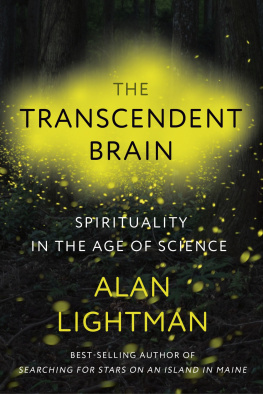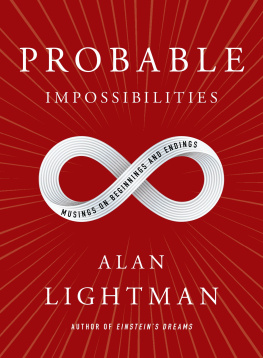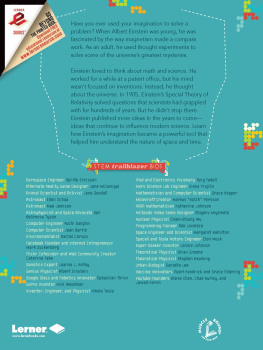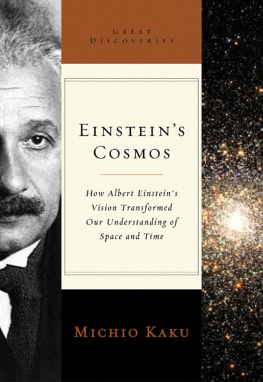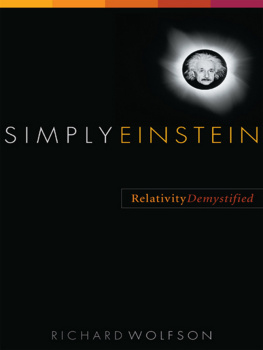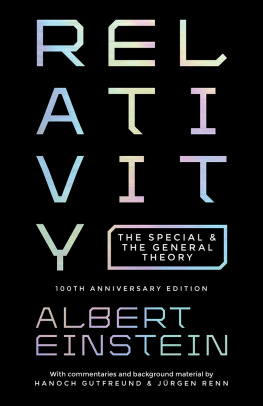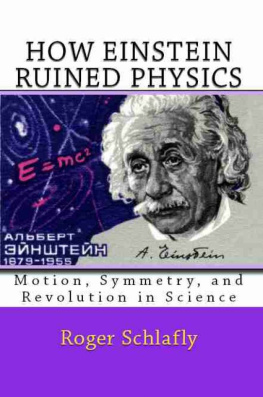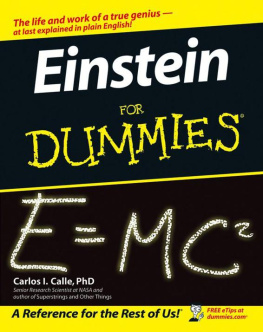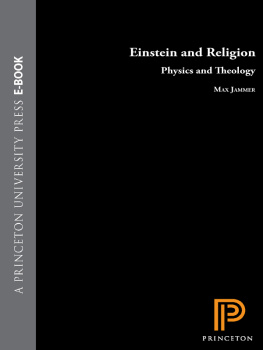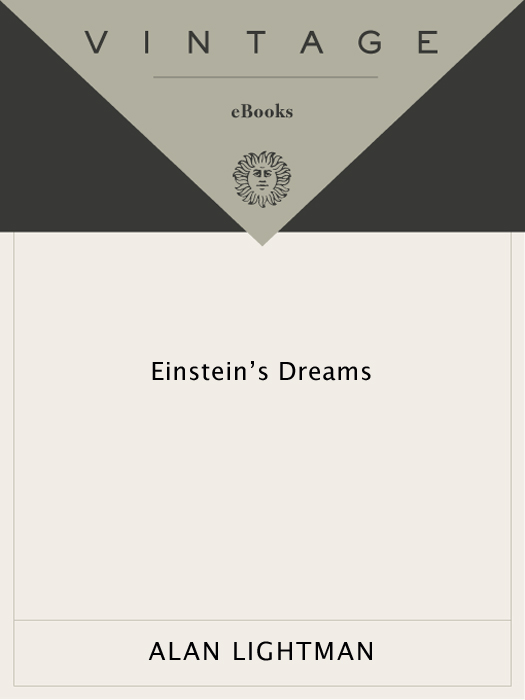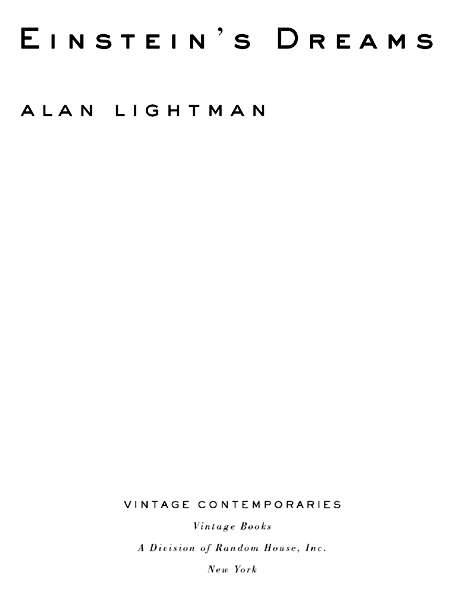A LAN L IGHTMAN
EINSTEINS DREAMS
Alan Lightman was born in Memphis, Tennessee, in 1948 and educated at Princeton and at the California Institute of Technology, where he received a Ph.D. in theoretical physics. His research papers in physics have appeared in numerous scientific journals. His essays and reviews have appeared in The Atlantic, Harpers, The New Yorker, The New York Review of Books, and other magazines. He is the author of a dozen books, including two collections of essays, Dance for Two and A Sense of the Mysterious, and four novels, Einsteins Dreams, Good Benito, The Diagnosis, and Reunion. Einsteins Dreams was an international bestseller and The Diagnosis was a finalist for the 2000 National Book Award in fiction. Lightman has served on the faculties of Harvard University and of the Massachusetts Institute of Technology, where he is currently an adjunct professor of humanities.
ALSO BY ALAN LIGHTMAN
Good Benito
Dance for Two: Selected Essays
The Diagnosis
Reunion
FIRST VINTAGE CONTEMPORARIES EDITION, NOVEMBER 2004
Copyright 1993 by Alan Lightman
Illustrations copyright 1993 by Chris Costello
All rights reserved under International and Pan-American Copyright Conventions. Published in the United States by Vintage Books, a division of Random House, Inc., New York, and simultaneously in Canada by Random House of Canada Limited, Toronto. Originally published in hardcover in the United States by Pantheon Books, a division of Random House, Inc., New York, in 1993.
Vintage and colophon are registered trademarks and Vintage Contemporaries is a trademark of Random House, Inc.
The Library of Congress has cataloged the Pantheon edition as follows:
Lightman, Alan P., 1948
Einsteins dreams / Alan Lightman.
p. cm.
1. Einstein, Albert. 18791955Fiction. I. Title.
PS3562.I45397E38 1993
813.54dc20 92-50465
eISBN: 978-0-307-78974-7
www.vintagebooks.com
v3.1
Contents
P ROLOGUE
In some distant arcade, a clock tower calls out six times and then stops. The young man slumps at his desk. He has come to the office at dawn, after another upheaval. His hair is uncombed and his trousers are too big. In his hand he holds twenty crumpled pages, his new theory of time, which he will mail today to the German journal of physics.
Tiny sounds from the city drift through the room. A milk bottle clinks on a stone. An awning is cranked in a shop on Marktgasse. A vegetable cart moves slowly through a street. A man and woman talk in hushed tones in an apartment nearby.
In the dim light that seeps through the room, the desks appear shadowy and soft, like large sleeping animals. Except for the young mans desk, which is cluttered with half-opened books, the twelve oak desks are all neatly covered with documents, left from the previous day. Upon arriving in two hours, each clerk will know precisely where to begin. But at this moment, in this dim light, the documents on the desks are no more visible than the clock in the corner or the secretarys stool near the door. All that can be seen at this moment are the shadowy shapes of the desks and the hunched form of the young man.
Ten minutes past six, by the invisible clock on the wall. Minute by minute, new objects gain form. Here, a brass wastebasket appears. There, a calendar on a wall. Here, a family photograph, a box of paper clips, an inkwell, a pen. There, a typewriter, a jacket folded on a chair. In time, the ubiquitous bookshelves emerge from the night mist that hangs on the walls. The bookshelves hold notebooks of patents. One patent concerns a new drilling gear with teeth curved in a pattern to minimize friction. Another proposes an electrical transformer that holds constant voltage when the power supply varies. Another describes a typewriter with a low-velocity typebar that eliminates noise. It is a room full of practical ideas.
Outside, the tops of the Alps start to glow from the sun. It is late June. A boatman on the Aare unties his small skiff and pushes off, letting the current take him along Aarstrasse to Gerberngasse, where he will deliver his summer apples and berries. The baker arrives at his store on Marktgasse, fires his coal oven, begins mixing flour and yeast. Two lovers embrace on the Nydegg Bridge, gaze wistfully into the river below. A man stands on his balcony on Schifflaube, studies the pink sky. A woman who cannot sleep walks slowly down Kramgasse, peering into each dark arcade, reading the posters in halflight.
In the long, narrow office on Speichergasse, the room full of practical ideas, the young patent clerk still sprawls in his chair, head down on his desk. For the past several months, since the middle of April, he has dreamed many dreams about time. His dreams have taken hold of his research. His dreams have worn him out, exhausted him so that he sometimes cannot tell whether he is awake or asleep. But the dreaming is finished. Out of many possible natures of time, imagined in as many nights, one seems compelling. Not that the others are impossible. The others might exist in other worlds.
The young man shifts in his chair, waiting for the typist to come, and softly hums from Beethovens Moonlight Sonata.
14 A PRIL 1905
Suppose time is a circle, bending back on itself. The world repeats itself, precisely, endlessly.
For the most part, people do not know they will live their lives over. Traders do not know that they will make the same bargain again and again. Politicians do not know that they will shout from the same lectern an infinite number of times in the cycles of time. Parents treasure the first laugh from their child as if they will not hear it again. Lovers making love the first time undress shyly, show surprise at the supple thigh, the fragile nipple. How would they know that each secret glimpse, each touch, will be repeated again and again and again, exactly as before?
On Marktgasse, it is the same. How could the shopkeepers know that each handmade sweater, each embroidered handkerchief, each chocolate candy, each intricate compass and watch will return to their stalls? At dusk, the shopkeepers go home to their families or drink beer in the taverns, calling happily to friends down the vaulted alleys, caressing each moment as an emerald on temporary consignment. How could they know that nothing is temporary, that all will happen again? No more than an ant crawling round the rim of a crystal chandelier knows that it will return to where it began.
In the hospital on Gerberngasse, a woman says goodbye to her husband. He lies in bed and stares at her emptily. In the last two months, his cancer has spread from his throat to his liver, his pancreas, his brain. His two young children sit on one chair in the corner of the room, frightened to look at their father, his sunken cheeks, the withered skin of an old man. The wife comes to the bed and kisses her husband softly on the forehead, whispers goodbye, and quickly leaves with the children. She is certain that this was the last kiss. How could she know that time will begin again, that she will be born again, will study at the gymnasium again, will show her paintings at the gallery in Zrich, will again meet her husband in the small library in Fribourg, will again go sailing with him in Thun Lake on a warm day in July, will give birth again, that her husband will again work for eight years at the pharmaceutical and come home one evening with a lump in his throat, will again throw up and get weak and end up in this hospital, this room, this bed, this moment. How could she know?



